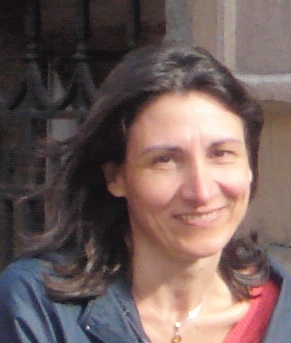|
Master's degree in Computer Science and Engineering
|
Foundations of programming and specification languages (2025/2026)
|
12
|

|
3
|
(Teoria)
|
|
PhD in Computer Science
|
Introduction to Quantum Machine Learning (2025/2026)
|
3
|

|
3
|
|
|
Bachelor's degree in Computer Science
Course partially running
|
Logic
(2025/2026)
|
6
|

|
6
|
|
|
Master's degree in Computer Science and Engineering
|
Quantum Computing (2025/2026)
|
6
|

|
1
|
(Laboratorio)
|
|
5
|
(Teoria)
|
|
Bachelor's degree in Computer Science
Course partially running
|
Compilers (2024/2025)
|
6
|

|
1
|
(Laboratorio)
|
|
Master's degree in Computer Science and Engineering
Course partially running
|
Interactive Theorem Proving (2024/2025)
|
6
|

|
6
|
|
|
PhD in Computer Science
|
Introduction to Quantum Machine Learning (2024/2025)
|
3
|

|
3
|
|
|
Master's degree in Computer Science and Engineering
Course partially running
|
Quantum Computing (2024/2025)
|
6
|

|
5
|
(Teoria)
|
|
1
|
(Laboratorio)
|
|
PhD in Computer Science
|
Introduction to Quantum Machine Learning (2023/2024)
|
4
|

|
4
|
|
|
Bachelor's degree in Computer Science
Course partially running
|
Logic [Matricole dispari] (2023/2024)
|
6
|

|
|
|
|
Bachelor's degree in Computer Science
Course partially running
|
Logic [Matricole pari] (2023/2024)
|
6
|

|
6
|
|
|
Master's degree in Computer Science and Engineering
Course partially running
|
Quantum Computing (2023/2024)
|
6
|

|
5
|
(Teoria)
|
|
1
|
(Laboratorio)
|
|
PhD in Computer Science
|
Lezioni Dottorandi (2022/2023)
|
50
|

|
1
|
|
|
Bachelor's degree in Computer Science
Course partially running
|
Logic [Matricole dispari] (2022/2023)
|
6
|

|
|
|
|
Bachelor's degree in Computer Science
Course partially running
|
Logic [Matricole pari] (2022/2023)
|
6
|

|
6
|
|
|
Bachelor's degree in Computer Science
Course partially running
|
Logic [Matricole pari] (2021/2022)
|
6
|

|
6
|
|
|
Master's degree in Computer Science and Engineering
Course partially running
|
Quantum Computing (2021/2022)
|
6
|

|
5
|
(Teoria)
|
|
1
|
(Laboratorio)
|
|
Bachelor's degree in Computer Science
Course partially running
|
Logic [Matricole dispari] (2020/2021)
|
6
|

|
6
|
|
|
Master's degree in Computer Science and Engineering
Course partially running
|
Quantum Computing (2020/2021)
|
6
|

|
1
|
(Laboratorio)
|
|
5
|
(Teoria)
|
|
Bachelor's degree in Computer Science
Course partially running
|
Compilers (2019/2020)
|
6
|

|
6
|
|
|
Bachelor's degree in Biotechnology
Course partially running
|
Information Technology (2019/2020)
|
6
|

|
6
|
|
|
Bachelor's degree in Computer Science
Course partially running
|
Compilers (2018/2019)
|
6
|

|
6
|
|
|
Bachelor's degree in Biotechnology
Course partially running
|
Information Technology (2018/2019)
|
6
|

|
6
|
|
|
Bachelor's degree in Computer Science
Course partially running
|
Compilers (2017/2018)
|
6
|

|
6
|
|
|
Bachelor's degree in Biotechnology
Course partially running
|
Information Technology (2017/2018)
|
6
|

|
6
|
|
|
Bachelor's degree in Biotechnology
Course partially running
|
Information Technology (2016/2017)
|
6
|

|
6
|
|
|
Bachelor's degree in Computer Science
Course partially running
|
Languages and compilers
(2016/2017)
|
12
|

|
6
|
COMPILATORI
|
|
Bachelor's degree in Biotechnology
Course partially running
|
Information Technology (2015/2016)
|
6
|
|
6
|
|
|
Bachelor's degree in Computer Science
Course partially running
|
Languages and compilers
(2015/2016)
|
12
|
|
6
|
COMPILATORI
|
|
Master's degree in Computer Science and Engineering
Course partially running
|
Advanced Compilers (2013/2014)
|
6
|
|
1
|
|
|
Bachelor's degree in Computer Science
Course partially running
|
Languages and compilers
(2013/2014)
|
12
|
|
6
|
COMPILATORI
|
|
Master's degree in Computer Science and Engineering
Course partially running
|
Quantum computing (2013/2014)
|
6
|
|
5
|
|
|
Master's degree in Computer Science and Engineering
Course partially running
|
Advanced Compilers (2012/2013)
|
6
|
|
1
|
|
|
Bachelor's degree in Computer Science
Course partially running
|
Languages and compilers
(2012/2013)
|
12
|
|
6
|
COMPILATORI
|
|
Master's degree in Computer Science and Engineering
Course partially running
|
Quantum computing (2012/2013)
|
6
|
|
5
|
|
|
Bachelor's degree in Computer Science
Course partially running
|
Languages and compilers
(2011/2012)
|
12
|
|
6
|
LINGUAGGI
|
|
6
|
COMPILATORI
|
|
Master's degree in Computer Science and Engineering
Course partially running
|
Quantum computing (2011/2012)
|
6
|
|
5
|
|
|
Bachelor's degree in Computer Science
Course partially running
|
Computer Networks (2010/2011)
|
6
|
|
6
|
|
|
Bachelor's degree in Computer Science
Course partially running
|
Programming II (2010/2011)
|
6
|
|
6
|
|
|
Master's degree in Computer Science and Engineering
Course partially running
|
Quantum computing (2009/2010)
|
6
|
|
5
|
(Teoria e Esercitazioni)
|
|
Bachelor's degree in Bioinformatics (until 2008-2009)
Course Not running, not visible
|
Algorithms and Data Structures (2008/2009)
|
10
|
|
8
|
Teoria
|
|
Masters in Computer Science
|
Quantum computing (2008/2009)
|
5
|
|
5
|
|
|
Bachelor's degree in Bioinformatics (until 2008-2009)
Course Not running, not visible
|
Algorithms and Data Structures (2007/2008)
|
10
|
|
8
|
Teoria
|
|
Masters in Computer Science
|
Quantum computing (2007/2008)
|
5
|
|
5
|
|
|
Bachelor's degree in Multimedia Information Technology (until 2008-2009)
Course Not running, not visible
|
Databases and Multimedia (2006/2007)
|
10
|
|
2
|
Laboratorio
|








 dipierro
dipierro univr
univr

